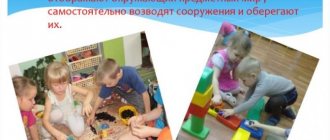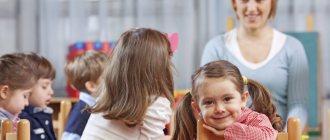MAGAZINE Preschooler.RF
“Cultivating tolerance in preschoolers”Teacher of MADOU d/s No. 37 Tynkacheva M.N.
The problem of protecting children's rights exists all over the world. One of the tasks contributing to its solution is educating the children themselves. From the moment of birth, a person is already endowed with rights that are enshrined in international and Russian legislation:
- Declaration of the Rights of the Child (1959);
- UN Convention on the Rights of the Child (1989);
- World Declaration on the Survival, Protection and Development of Children (1990);
- Family Code of the Russian Federation (1995);
- Federal Law “On Basic Guarantees of the Rights of the Child in the Russian Federation” (1988);
- Law “On Education” (1992), etc.
P 3. 3. 4. Federal state requirements for the structure of the basic general education program of preschool education states: “The content of the educational field “Socialization” is aimed at... solving the following tasks: familiarization with elementary generally accepted norms and rules of relationships with peers and adults (including moral)..."
The main task of the state and society in relation to children is to provide optimal conditions for the development of their individual abilities, the possibility of self-regulation, regardless of psychophysical characteristics, i.e. protect the rights of every child at any stage of his development and form in him the foundations of respect for the rights of others, and introduce him to universal human values.
A modern cultured person is not only an educated person, but also one who has a sense of self-respect and is respected by others. It is important to develop in the younger generation the ability to build relationships in the process of interacting with others on the basis of cooperation and mutual understanding. Willingness to accept other people, their views, customs, habits as they are. The task of a modern educational institution is to ensure that students emerge from its walls not only with a certain amount of knowledge, skills and abilities, but also independent people who have tolerance as the basis of their life position.
“Tolerance is what makes the movement of peace possible and leads from a culture of war to a culture of peace,” says the Declaration of Principles of Tolerance, adopted in 1995 by the General Conference of UNESCO. In the context of humanization and democratization of society, the problem of tolerance is very relevant, since today the values and principles necessary for common survival and development come to the fore:
- ethics and strategy of nonviolence
- the idea of tolerance towards foreign and alien positions, values, cultures
- the need to search for dialogue and mutual understanding, mutually acceptable compromises, etc.
Russia is a multinational state, so from preschool age it is necessary to introduce children not only to the culture of their people, but also to respectful, kind attitude towards representatives of other cultures.
A child begins to form his or her attitude towards a person of a different nationality from about 4 years of age, based on elementary manifestations of universal human feelings and unbiased knowledge, while the uniqueness of the national only emphasizes the significance of what is universal. Typically, children of older preschool age do not come into conflict with people of other nationalities. At the same time, manifestations of a different attitude were noticed: ridicule, mockery, fear, etc. They are based on the following factors:
- childlike spontaneity
- limited life experience
- lack of ideas about people of other nationalities and their culture, lack of communication with them
- childish tactlessness, etc.
A child of senior preschool age can regulate behavior on the basis of learned norms and rules, his own ethical ideas, and not in response to the demands of other people. Emotionally experiences non-compliance with norms and rules and inconsistency of behavior with one’s ethical ideas. Behavior becomes more restrained. Plays together, restrains aggressive reactions, shares, distributes roles fairly, helps in interacting with friends.
Thus, the problem of tolerance can be classified as educational and work in this direction can begin from preschool age, since it is then that the value foundations of the worldview are laid.
It is necessary to acquaint older preschoolers with their basic rights, to form an internal and external legal culture, tolerant behavior, so that the main moral qualities (justice, respect, compassion, goodwill, self-esteem) become an integral part of their lives.
| Next > |
Pedagogical project Tolerance Week
Author: social teacher Sergeeva Irina Ivanovna.
MDOU No. 31 "Rucheek" Stavropol Territory, Aleksandrovsky district, village. Alexandrovskoe.
Project "Week of Tolerance"
In November, the whole world celebrates the International Day of Tolerance. Therefore, the task of teachers is to develop in children a sense of unity, mutual understanding, and respect for people of other nationalities, starting from preschool age. The goal of the “Tolerance Week” project was to promote the formation in children and adults of a culture of tolerance, a desire to understand themselves and the people around them, as well as constructive ways of interacting with each other.
File: project
Project
"Week of Tolerance"
Project passport
| Project name | "Week of Tolerance" |
| Objective of the project | To promote in children and adults a culture of tolerance, a desire to understand themselves and the people around them, as well as constructive ways of interacting with each other . |
| Tasks | • cultivate a culture of relationships among peers, the desire to do good deeds; • develop teamwork skills, the ability to see and understand another person, show empathy and sympathy for people. • improve the culture of interpersonal interaction between children in the group. consolidate moral ideas and skills of socially acceptable behavior. |
| Project type | • short-term |
| Project participants | • Social teacher, educational psychologist, pupils of the 2nd early, junior, middle, senior, preparatory groups, teachers, parents. |
| Project duration | • from 11/19/18 - 11/23/18 |
| Relevance | • In November, the whole world celebrates the International Day of Tolerance. This holiday is quite young, but deserves great respect. The relevance of this holiday lies in the fact that in modern life people often tend to be hostile towards “other people” - not like everyone else, those who are different from us. Therefore, the task of teachers is to develop in children a sense of unity, mutual understanding, and respect for people of other nationalities, starting from preschool age. |
| Project implementation stages | The first stage is preparatory The second stage is organizational and practical • The third stage is the final one |
| Material, technical and information support | Use of ICT, musical accompaniment |
Plan for the week of tolerance at MDOU No. 31 “Rucheyok”
(as part of the celebration of World Tolerance Day - November 16, 2018)
11/19/2018 – 11/23/2018
| Day of the week | Theme of the day | Category of participants | Events | Responsible teacher |
| Monday (19.11.2018) | Day of pleasant acquaintances “Let's hold hands, friends» | Teachers | 1. Consultation for teachers “Tolerance as a principle in interaction between people” | Social teacher Sergeeva I.I. |
| middle, senior, preparatory groups 2early, youngest, middle, senior, preparatory groups | 1.Organization of mutual visits of children of different groups with playing exercises: - “Let's say hello”, children are invited to greet each other as they want (hugs, handshakes...) and “New acquaintances” (children are invited to get to know each other). 2. Action “Sending greetings” (children producing letters with surprises with further exchange of these greetings) | Group teachers Social teacher Sergeeva I.I., Teacher-psychologist Blinnikova G.N. | ||
| Families of pupils | 1.Consultation for parents “What is tolerance” | Social teacher Sergeeva I.I. | ||
| Tuesday (20.11.2018) | Day of Smiles “A smile will make everyone brighter” | Teachers Parents, teachers, all groups | 1. Training with teachers on the prevention of emotional burnout 2. Photo of the day “Smile”. A photo of all participants in the educational process in an unexpected and relaxed atmosphere, then choosing the best photo of the day! | Social teacher Sergeeva I.I., Teacher-psychologist Blinnikova G.N. |
| 2 early, youngest, middle, senior, preparatory groups average senior, preparatory | 1. Drawing by children on the theme “Funny emoticons”. Give emoticons to your friends. | |||
| 2.Game activity “In a world of kindness” 3. Game sketches “Land of Moods” |
Teacher-psychologist Blinnikova G.N.
Social teacher Sergeeva I.I.
Families of pupilsPhoto exhibition “The Smile of Our Family” Social teacher Sergeeva I.I.Sreda(21.11.2018)Friendship Day “Friendship is a gift to us from above, friendship is the light in the window; a friend will always hear you, he won’t leave you even in trouble.” Teachers Workshop “Games to develop friendliness in children” (“I’m friends with...”, “Island of Friendship” (with a newspaper), “Who is friends with whom”, etc.) Social teacher Sergeeva I.I.
teacher-psychologist Blinnikova G.N. Preparatory Lesson “The best name in the world is my name” Teacher-psychologist Blinnikova G.N. Thursday
(22.11.2017)Kindness Day “Being kind is easy”Teachers Information on the “Tolerance Week” project.
Forming the foundations of a tolerant culture is one of the important and pressing problems of our time, both in education and in society as a whole. The International Day of Tolerance is celebrated annually on November 16th. As part of this holiday, from November 19 to 20, 2022, Tolerance Week was held at the preschool educational institution. Game exercises were carried out with children of the middle, senior, and preparatory groups: “Let’s say hello and “New acquaintances.” During the week, the “Sending Greetings” (children making letters with surprises with the further exchange of these surprises) and “River of Peace and Goodness” (decorating stairwells in the form of a river with boats with wishes written on them) were held.
In the middle, senior, and preparatory groups classes were held: “The best name in the world is my name ” “In the world of kindness.”
Pupils from all groups drew on the theme “Funny emoticons” and then gave them to each other.
As part of the week's events, teachers in our garden were also “tested” for tolerance. They were given a consultation on “Tolerance as a principle of interaction between people”, teachers took part in the training “Prevention of emotional burnout”, and also got acquainted with new games to develop friendliness in children.
We didn’t forget about parents; we prepared a consultation for them “What is tolerance?” Parents and their children also took part in the photo exhibition “The Smile of Our Family” and in the “River of Peace and Kindness” campaign.
The final entertainment “Journey to the Land of Friends” was fun.
Photo report for the project
| Social teacher Sergeeva I.I. Teacher-psychologist Blinnikova G.N. | ||||
| Middle, senior, preparatory groups | Games for developing friendly feelings in students: Game "Good deeds" Game "Bag of Bad Deeds" | Group teachers | ||
| Families of pupils | 1. Action “River of Peace and Goodness” (decoration of staircases in the form of a river with boats on which wishes are written). | Group teachers, Teacher-psychologist Blinnikova G.N. Social teacher Sergeeva I.I. | ||
| Friday (23.11.2017) | Tolerance Day “We are so different, but we are together!” | Senior preparatory | Entertainment “Journey to the Land of Friendship” | Group teachers, teacher-psychologist Blinnikova G.N. |
| Teachers, families of pupils, pupils | Exhibition “Ships of Peace and Goodness”, | Group teachers, Social teacher Sergeeva I.I. Teacher-psychologist Blinnikova G.N. |






